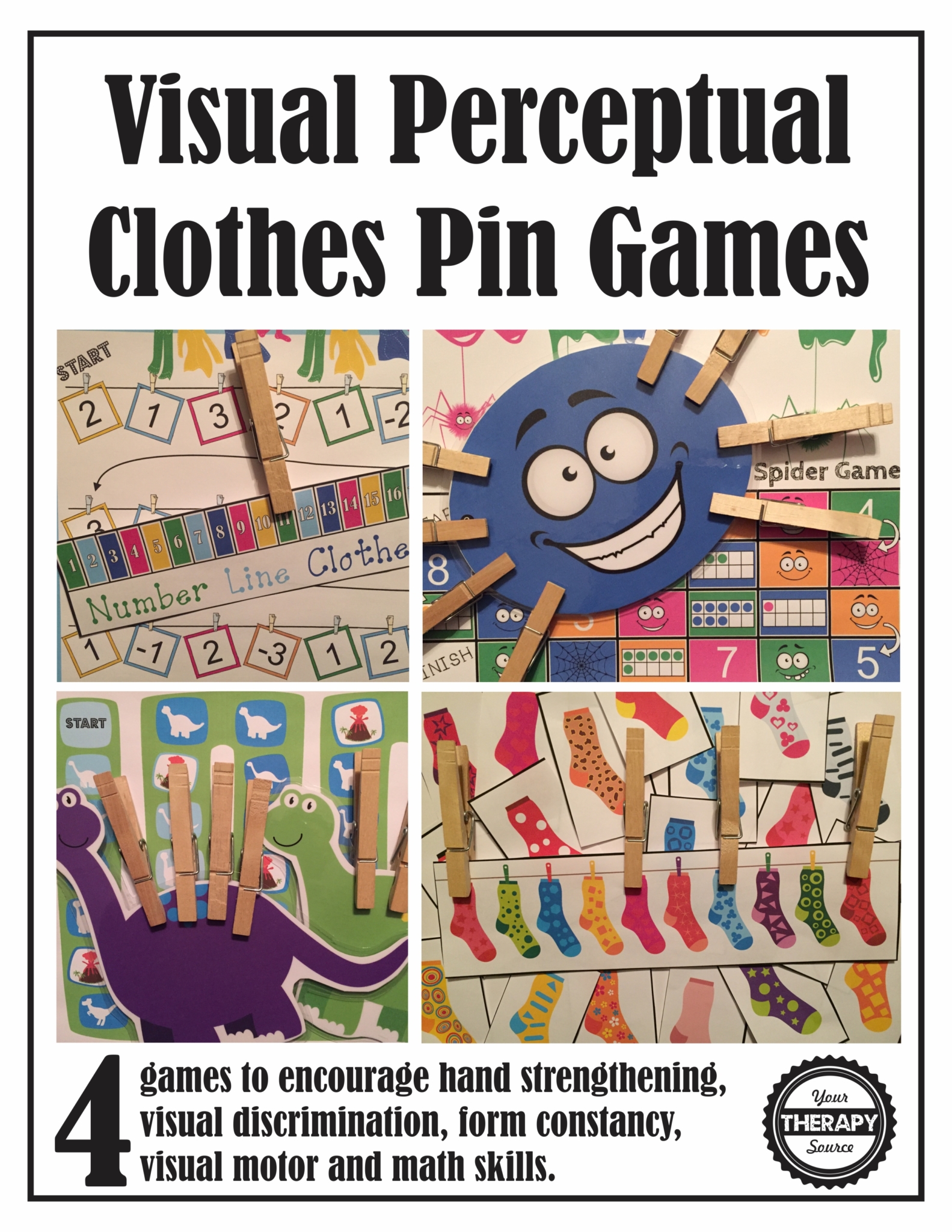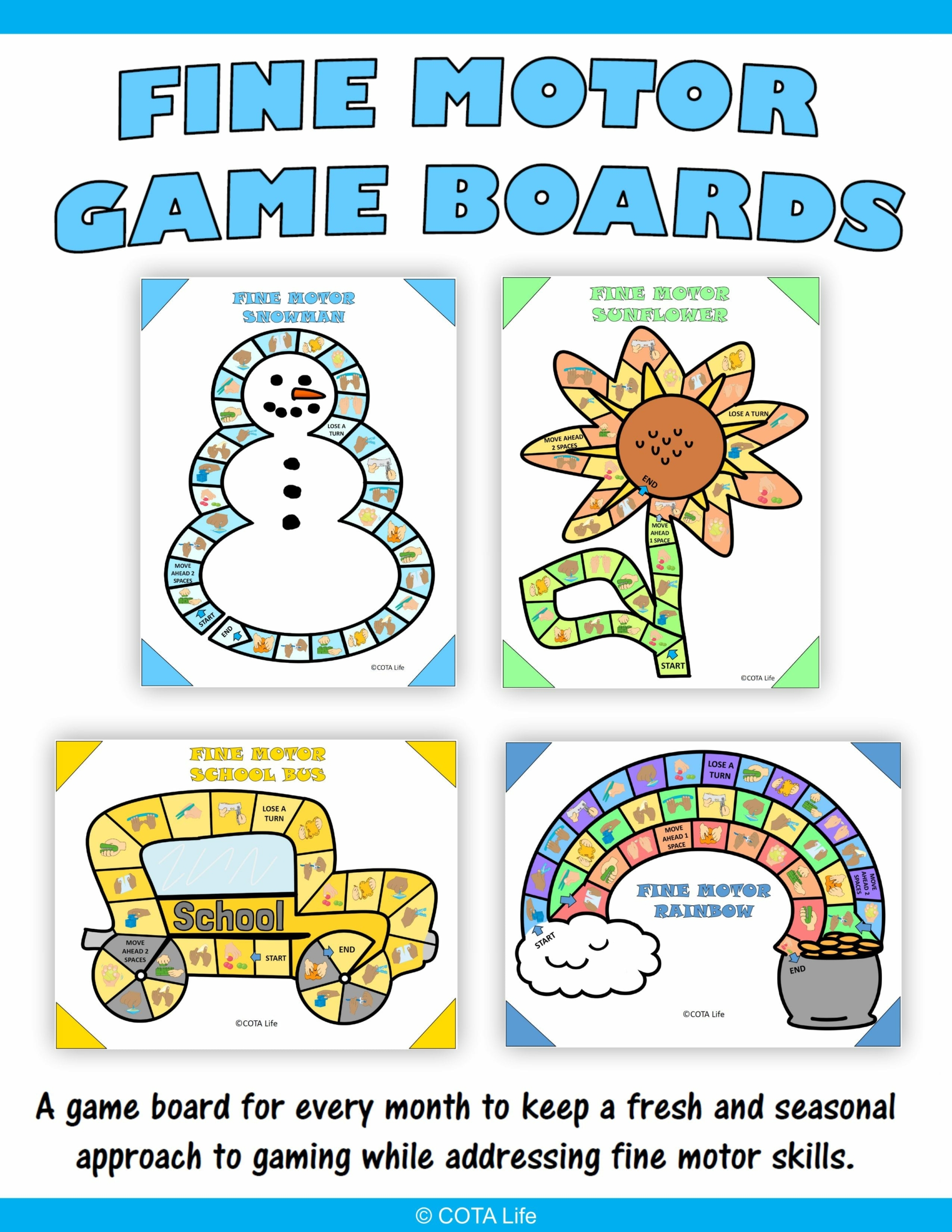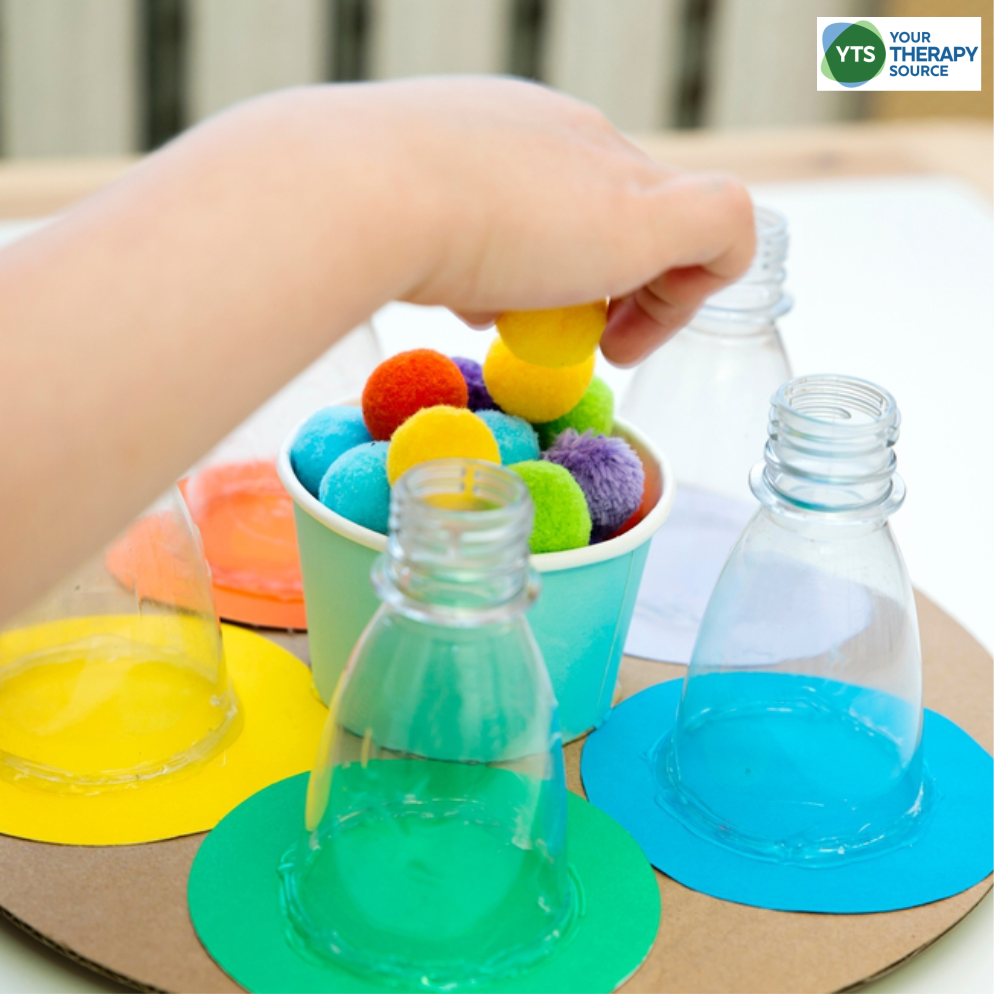Fine Motor Games for Preschoolers

Learning should be fun and interesting in preschool! Young children can improve their finger dexterity and strength of small hand muscles with games. Furthermore, fine motor games for preschoolers allow for success in activities such as writing, cutting, feeding, and dressing.
FINE MOTOR GAMES FOR PRESCHOOLERS – WHY ARE THEY IMPORTANT?
Fine motor games for preschoolers become an important part of the classroom for a variety of reasons. Including rules and challenges to activities makes learning fine motor skills fun and entertaining. Games also allow for the development of hand-eye coordination, pinch and grip strength, and bilateral coordination.
HAND-EYE COORDINATION
Hand-eye coordination is when the eyes work with the hands to successfully complete an activity or task. This opens up the opportunity for more success in such activities as handwriting, using scissors, and feeding. Hand-eye coordination affects most of the activities that preschoolers do throughout the day.
PINCH AND GRIP STRENGTH
Fine motor development improves in children who participate in games that involve developing pinch and grip strength. For instance, a pincer grasp is when a child pinches a small object between the thumb and the index finger. In addition, good grasp strength is when children use the small muscles of the hand to manipulate objects. Both are important areas of development so preschoolers can develop a good pencil grip, learn to write, and use utensils.
BILATERAL COORDINATION
Bilateral coordination is when children use both sides of the body at the same time during tasks. Good bilateral coordination means both sides of the brain are working together and children are participating in two-handed tasks in a coordinated manner. It is important so preschoolers can feed themselves and manage snack containers and clothing fasteners (i.e. buttons, zippers, snaps, and tying shoe laces).
FINE MOTOR GAMES FOR PRESCHOOL
The first goal with fine motor skills activities is to capture the attention of the preschoolers! If the preschoolers see their classmates participating, it is a win-win for the teacher and the students. The teachers get to help develop the fine motor skills of each of their students while the students have fun and improve their social interaction with their peers.
- Finger Games – fun finger/hand games for keeping kids busy while waiting for an appointment or waiting in that long dreaded line (i.e. Rock, Paper, Scissors, and Miss Mary Mack)
- Cat Fine Motor Game – a great activity for cat lovers that works on fine motor skills
- hole punch game with dice – roll the dice and hole punch the number of colored circles rolled on the dice
- lacing cards of the alphabet or letter of each child’s name with yarn
- clothespin game with paper plate and dice – put numbers on the outside of a decorated paper plate (i.e. sun, flower, turkey) and roll dice to clip the numbered clothespin on the corresponding number
- sponge relay races – soak up the water with a large sponge from the bucket and run to an empty bucket to squeeze the water out of the sponge
- scavenger hunt – can use different objects and use holiday-themed objects
- spoon race with plastic eggs

Visual Perceptual Clothespin Games
FUNCTIONAL FINE MOTOR GAMES FOR PRESCHOOLERS
Functional fine motor games incorporate everyday objects with fine motor practice. These games also are a great way of bringing the family together for some quality time and taking a break from technology. Moreover, most of these games include objects that are in your home.
- apple stack – see how many apples can stack on top of each other
- cookie cutters – cut out and make different cookie shapes
- cheerios necklace or bracelet – string cheerios on a pipe cleaner or thread to make a favorite necklace or bracelet
- stack coins on a table or place coins in a piggy bank or container with a slit at the top
- homemade bowling – fill plastic water bottles with colored water and try to knock the pins down with a ball or an orange
- wrap and unwrap items in tinfoil like a present
FINE MOTOR GAMES FOR 3-YEAR-OLDS
3-year-old children usually have an attention span of about 6-8 minutes before they lose interest in an activity. Individual games that are timed or fine motor stations with various sensory bins work well with this age group. It is a good idea to have a bunch of games available so games can be rotated to keep their interest high.
- use tweezers or small tongs to place colored pom poms into corresponding labeled plastic bottles, worksheets with circles, or an ice cube tray
- rainbow pasta matching game – color uncooked pasta and try to match up colors
- hide and seek sensory bin – use tongs to see how many small toys can be found in a bin with shredded construction paper
- finger-paints or brush paints – put different colors of paint on bubble wrap circles with a finger or paintbrush and call out colors for preschoolers to pop
- paper plate ring toss – cut the center of the paper plate out and toss the ring onto water bottles or paper towel roll holders
- balloon taps – keep a balloon up in the air without it hitting the ground – the teacher can call out different fingers to tap the balloon

Fine Motor Board Games
FINE MOTOR GAMES FOR 4-YEAR-OLDS
4- year-old children usually have an attention span of about 8-12 minutes before they want to find another game to play. For the most part, they are now good at sharing and taking turns with their peers. Preschoolers now have fun playing games that involve pairs or groups.
- pasta pick up – pick up uncooked pasta (i.e. rigatoni, ditalini) with an uncooked spaghetti stick and place it into a bowl.
- bingo – make bingo cards (i.e. different shapes, animals, holiday objects) and mark with short broken crayons or dot markers. Body Part Bingo is great for 4 year olds!
- stack race with candy – stack pieces of candy with tweezers (i.e. marshmallows, skittles, candy corn, conversation hearts)
- balloon volleyball – hitting a balloon back and forth with a partner
- cotton ball straw race – blow a cotton ball across the table or floor with a straw
- make art with a straw and watercolor paint – blow the paint across the paper.
- memory game – place a small object in each slot of half of an egg carton (i.e. legos, small toys) and cover to see if the child can remember the same sequence in the other half of the egg carton
- visual memory tray game – put items on a tray. Remove one item. Can they remember what you removed?
Playing games in preschool allows children to look forward to going to school. In addition, children learn how to take turns and get along with others. But most importantly, games help develop fine motor skills.
RELATED POSTS:
Fine Motor Activities for Preschoolers – strategies for developing fine motor skills in preschoolers and different fun activities to do at preschool and at home.
Preschool Drawing Games – teaching preschoolers how to draw lines and shapes and turn them into a game.
Movement Games for Preschoolers – entertaining games for preschoolers to get their bodies moving around the room.

ARTICLE WRITTEN BY:
Kimberly Orlando, MOTR/L – Kimberly Orlando received her Master of Occupational Therapy from Chatham University in Pittsburgh, PA in 2001, and received her Level 1 Handwriting Specialist Certification through Handwriting Without Tears in 2012 in the areas of Pre-K Readiness, Printing, Cursive, and The Print Tool Evaluation. With 21 total years of experience as an Occupational Therapist, she has 6 years of experience providing services in hospital and home health care settings and 15 years of experience in early intervention and school settings (Pre-K through middle school levels). Kimberly also has experience tutoring children with fine motor and handwriting concerns.


